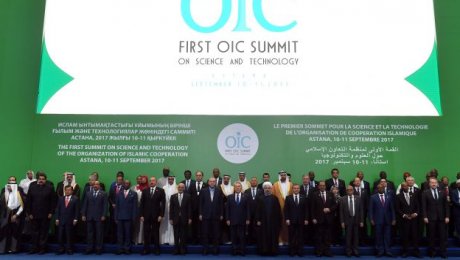Striving to contribute to the development of the Islamic world through closer cooperation with western countries, Kazakhstan is hosting the first science and technology summit of the Organization of Islamic Cooperation (OIC), headlined “Science, Technology, Innovation, and Modernization in the Islamic World.”
"I think it is necessary to create a forum, like the G20, an informal group for the development of science and economy in the Islamic world. Out of the developed 15 states of the Organization of Islamic Cooperation, it is possible to create an OIC-15 organization,” Kazkahstan’s President Nursultan Nazarbayev, who opened the summit, told the heads of state and government gathered. Founded in 1969, the OIC is comprised of 57 nations with significant, if not majority, Muslim populations.
“The development of science and technology is very important for us," Nazarbayev added.
The event opened in Astana on Sunday, the same day EXPO 2017 – a modern-day version of the world’s fair – wound down. The expo opened on June 10 and had the future of energy as its central theme, showcasing technologies via national pavilions from more than 50 countries.
Addressing the summit where 15 presidents and prime ministers and delegates from nearly 80 Muslim and non-Muslim countries were gathered, Nazarbayev urged the audience to abandon stereotypes and work towards finding ways the Muslim world can achieve what western countries have already in the realms of science and technological innovation. He recommended creating an action plan for establishing a science and foundation that will allow for greater collaboration between institutions from the west and the Muslim world.
At a time when other regions of the world have developed, many Muslim countries lag behind. Some critics have associated trend the religion itself, but Nazarbayev believes Kazakhstan and other Muslim majority countries in the region offer an example of moderation, tolerance, even scientific achievement and economic advancement.
"Unfortunately, recently the Islamic Ummah (community) has faced various hardships,” Nazarbayev said. “First of all, Muslim countries themselves suffer from the spread of extremist and terrorist organizations and their terrorist attacks. Secondly, Islamophobia is spreading and criminal acts against Muslims are on the rise in Western countries.”
Nazarbayev voiced his eagerness to share Kazakhstan’s experience on how various ethnic groups live in peace and harmony.
“For 14 years, we have been holding Congresses of leaders [from around the] world . . . where representatives of different religious denominations come together,” the president said. Kazakhstan will host the sixth Congress of Leaders World and Traditional Religions from October 10-11, 2018.
Erdogan pointed at some grim statistics: At present, 55 percent of the populations within Islamic countries are illiterate. These countries allocate on average less than one percent of their gross domestic product for education, compared with 5.2 percent by countries within the Organization for Economic Cooperation and Development.
"Our most successful children, the brightest brains, go to Western countries and work in Western organizations. We also, unfortunately, consume and do not produce products in the field of information technology. This makes us vulnerable from the point of view of our national security," Erdogan said, suggesting OIC countries host exchanges for university students to increase collaboration and share knowledge and expertise.
Uzbekistan’s President Shavkat Mirziyoyev also admitted that many Muslim countries are lagging in scientific and technological progress.
"In the ranking of the top 500 universities in the world, there are only 11 universities of the member countries of our organization,” Mirziyoyev said. “In 2015, the share of applications worldwide from the OIC countries for obtaining patents made up only 1.9 percent.”







 Azerbaijan and Armenia started the process of demarcation of their border on Tuesday, with the installation of the first border markers based on ge...
Azerbaijan and Armenia started the process of demarcation of their border on Tuesday, with the installation of the first border markers based on ge...
 President Aliyev emphasized the critical role of the North-South Transport Corridor in fostering transport cooperation between Azerbaijan and Russi...
President Aliyev emphasized the critical role of the North-South Transport Corridor in fostering transport cooperation between Azerbaijan and Russi...
 Armenian sappers commenced on Monday mine-clearance operations in the territories adjacent to the Saint Mary Church in village of Voskepar (Armenia...
Armenian sappers commenced on Monday mine-clearance operations in the territories adjacent to the Saint Mary Church in village of Voskepar (Armenia...
 Russian Foreign Minister Sergei Lavrov has reasserted that Moscow has no intentions to stop the fighting in Ukraine, even if peace talks commence.
Russian Foreign Minister Sergei Lavrov has reasserted that Moscow has no intentions to stop the fighting in Ukraine, even if peace talks commence.
 Iran has refuted reports of alleged damage to Shimon Peres Negev Nuclear Research Centre located southeast of Dimona, Israel, during the recent air...
Iran has refuted reports of alleged damage to Shimon Peres Negev Nuclear Research Centre located southeast of Dimona, Israel, during the recent air...
 Iran’s Foreign Minister, Hossein Amir-Abdollahian, has labeled a foiled Israeli drone attack in certain parts of the country as a "failure" for Isr...
Iran’s Foreign Minister, Hossein Amir-Abdollahian, has labeled a foiled Israeli drone attack in certain parts of the country as a "failure" for Isr...



